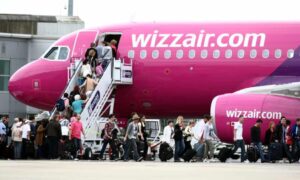
Aircraft could one day take off on fuel made from human waste under plans revealed by Wizz Air and the British sustainable aviation company Firefly to build a commercial refinery in Essex.
Firefly, based in Bristol, said it had developed a process to convert treated sewage into sustainable aviation fuel, or SAF.
The low-cost airline Wizz said it was investing by placing an order – potentially worth hundreds of millions of pounds – for up to 525,000 tonnes of Firefly’s waste-based fuel over the next 15 years.
Firefly has now signed agreements with industrial partners for a pilot refinery in Harwich that would take “biosolids” from Anglian Water and turn it into aircraft fuel. Airlines will have to ensure that a minimum proportion of fuel burned is certified sustainable in the coming decade, with the EU mandating at least 20% SAF by 2035, and the UK expected soon to announce a mandatory 10% by 2030.
There are various ways of making SAF but most are much more expensive than normal kerosene jet fuel, with a limited supply of waste feedstocks such as used cooking oil.
Firefly’s chief operations officer, Paul Hilditch, said converted sewage should be cheaper and more abundant, providing up to 5% of airlines’ fuel needs in the UK. The process uses biosolids, the water industry term for the final product in the treatment process. “It’s crumbly – like compost or wet chocolate cake,” he said. “There’s millions of tonnes of the stuff. And it has no intrinsic value.”
